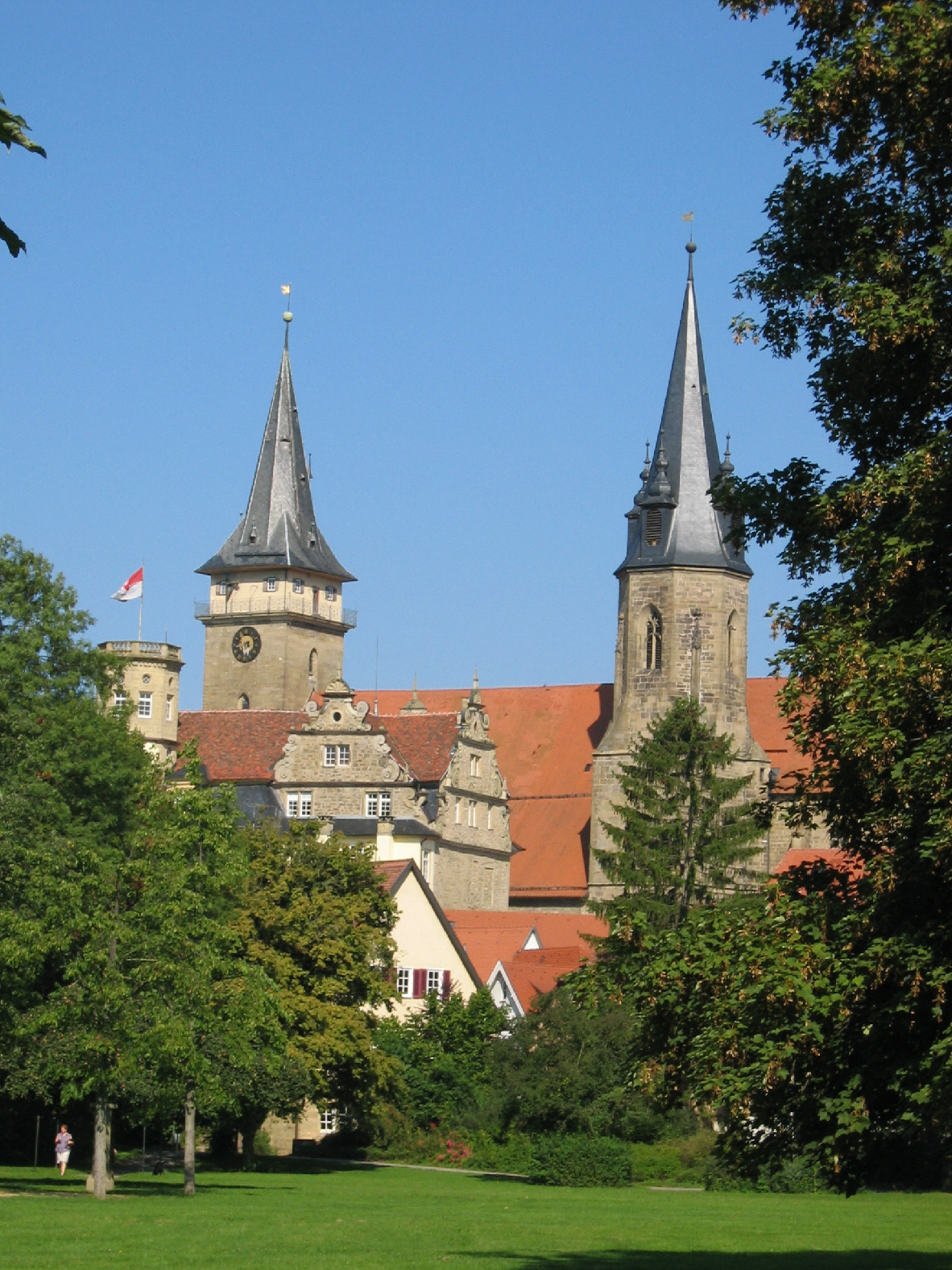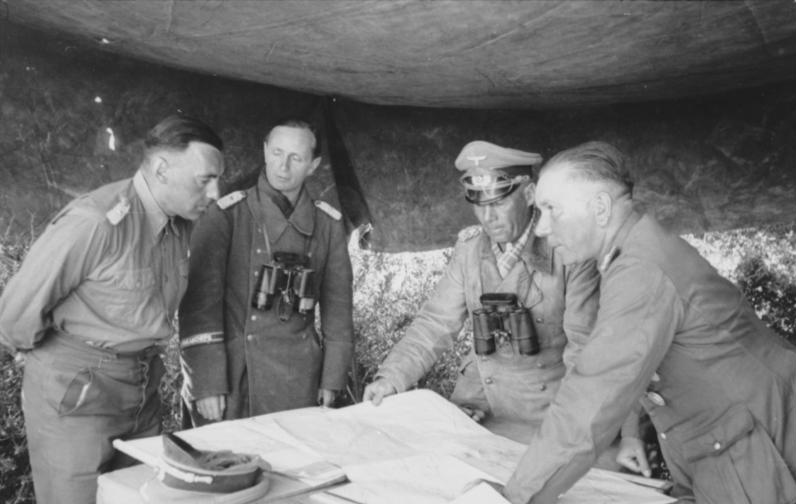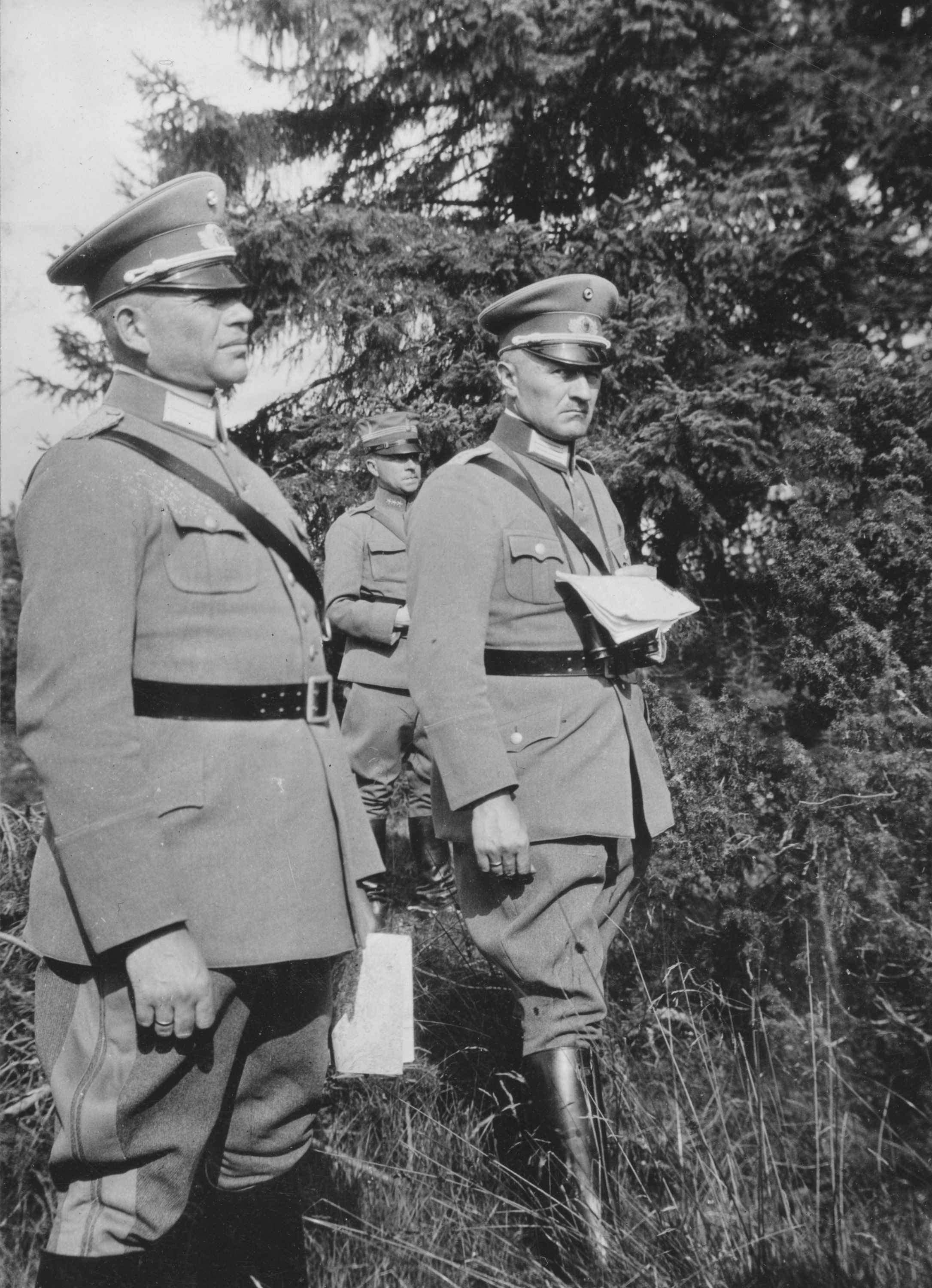|
Oswald Lutz
Oswald Lutz (6 November 1876 – 26 February 1944) was a German General who oversaw the motorization of the German Army in the late 1920s and early 1930s and was appointed as the commander of the Wehrmacht's Panzer Troops Command in 1935. Biography Born in Öhringen, Lutz joined the Bavarian Army as an officer cadet in 1894 and was commissioned as a ''Leutnant'' in the 1st Bavarian Engineer Battalion in 1896. After service in the German Imperial Army in World War I, he was retained in the ''Reichswehr'', in which he attained the rank of ''oberstleutnant'' in 1923 and ''oberst'' in 1928. On 1 April 1931, Lutz was appointed the Inspector of Motor Transport Troops. Promoted to ''generalmajor'', ''Oberstleutnant'' Heinz Guderian was appointed his chief-of-staff and ''Major'' Walter Nehring later joined his staff. Both men would go on to be influential in the establishment of the ''Panzerwaffe''. Lutz continued to oversee the motorization of the army and was promoted to ''general ... [...More Info...] [...Related Items...] OR: [Wikipedia] [Google] [Baidu] |
Öhringen
Öhringen (East Franconian: ''Ähringe'') is the largest town in Hohenlohe (district) in the state of Baden-Württemberg, in southwest Germany, near Heilbronn. Öhringen is on the railline to Schwäbisch Hall and Crailsheim. With a population of 24,374 (2019), the town is diverse. It is a quaint medieval place, and, among its ancient buildings, boasts a fine Evangelical church (german: Stiftskirche) containing carvings in cedar-wood from the 15th century and numerous interesting tombs and monuments; a Renaissance town hall; the building, now used as a library, which formerly belonged to a monastery, erected in 1034; and a palace, the former residence of the princes of Hohenlohe-Öhringen. ''Vicus Aurelii'' to the Romans. Eastwards of it runs the old limes Roman frontier wall, and numerous remains and inscriptions dating from the days of the Roman settlement have been discovered, including traces of three camps. Geography Geographical location Öhringen is located in the wes ... [...More Info...] [...Related Items...] OR: [Wikipedia] [Google] [Baidu] |
Oberstleutnant
() is a senior field officer rank in several German-speaking and Scandinavian countries, equivalent to Lieutenant colonel. It is currently used by both the ground and air forces of Austria, Germany, Switzerland, Denmark, and Norway. The Swedish rank is a direct translation, as is the Finnish rank . Austria Austria's armed forces, the ''Bundesheer'', uses the rank Oberstleutnant as its sixth-highest officer rank. Like in Germany and Switzerland, Oberstleutnants are above Majors and below Obersts. The term also finds usage with the Austrian Bundespolizei (federal police force) and Justizwache (prison guards corps). These two organizations are civilian in nature, but their ranks are nonetheless structured in a military fashion. Belgium File:Army-BEL-OF-04.svg, nl-BE, Luitenant-kolonelgerman: Oberstleutnant Denmark The Danish rank of is based around the German term. Ranked OF-4 within NATO and having the paygrade of M401, it is used in the Royal Danish Army and the ... [...More Info...] [...Related Items...] OR: [Wikipedia] [Google] [Baidu] |
Military Personnel Of Bavaria
A military, also known collectively as armed forces, is a heavily armed, highly organized force primarily intended for warfare. It is typically authorized and maintained by a sovereign state, with its members identifiable by their distinct military uniform. It may consist of one or more military branches such as an army, navy, air force, space force, marines, or coast guard. The main task of the military is usually defined as defence of the state and its interests against external armed threats. In broad usage, the terms ''armed forces'' and ''military'' are often treated as synonymous, although in technical usage a distinction is sometimes made in which a country's armed forces may include both its military and other paramilitary forces. There are various forms of irregular military forces, not belonging to a recognized state; though they share many attributes with regular military forces, they are less often referred to as simply ''military''. A nation's military may f ... [...More Info...] [...Related Items...] OR: [Wikipedia] [Google] [Baidu] |
People From The Kingdom Of Württemberg
A person ( : people) is a being that has certain capacities or attributes such as reason, morality, consciousness or self-consciousness, and being a part of a culturally established form of social relations such as kinship, ownership of property, or legal responsibility. The defining features of personhood and, consequently, what makes a person count as a person, differ widely among cultures and contexts. In addition to the question of personhood, of what makes a being count as a person to begin with, there are further questions about personal identity and self: both about what makes any particular person that particular person instead of another, and about what makes a person at one time the same person as they were or will be at another time despite any intervening changes. The plural form "people" is often used to refer to an entire nation or ethnic group (as in "a people"), and this was the original meaning of the word; it subsequently acquired its use as a plural form of per ... [...More Info...] [...Related Items...] OR: [Wikipedia] [Google] [Baidu] |
People From Öhringen
A person ( : people) is a being that has certain capacities or attributes such as reason, morality, consciousness or self-consciousness, and being a part of a culturally established form of social relations such as kinship, ownership of property, or legal responsibility. The defining features of personhood and, consequently, what makes a person count as a person, differ widely among cultures and contexts. In addition to the question of personhood, of what makes a being count as a person to begin with, there are further questions about personal identity and self: both about what makes any particular person that particular person instead of another, and about what makes a person at one time the same person as they were or will be at another time despite any intervening changes. The plural form "people" is often used to refer to an entire nation or ethnic group (as in "a people"), and this was the original meaning of the word; it subsequently acquired its use as a plural form of per ... [...More Info...] [...Related Items...] OR: [Wikipedia] [Google] [Baidu] |
1944 Deaths
Events Below, the events of World War II have the "WWII" prefix. January * January 2 – WWII: ** Free France, Free French General Jean de Lattre de Tassigny is appointed to command First Army (France), French Army B, part of the Sixth United States Army Group in North Africa. ** Landing at Saidor: 13,000 US and Australian troops land on Papua New Guinea, in an attempt to cut off a Japanese retreat. * January 8 – WWII: Philippine Commonwealth troops enter the province of Ilocos Sur in northern Luzon and attack Japanese forces. * January 11 ** President of the United States Franklin D. Roosevelt proposes a Second Bill of Rights for social and economic security, in his State of the Union address. ** The Nazi German administration expands Kraków-Płaszów concentration camp into the larger standalone ''Konzentrationslager Plaszow bei Krakau'' in occupied Poland. * January 12 – WWII: Winston Churchill and Charles de Gaulle begin a 2-day conference in Marrakech ... [...More Info...] [...Related Items...] OR: [Wikipedia] [Google] [Baidu] |
1876 Births
Events January–March * January 1 ** The Reichsbank opens in Berlin. ** The Bass Brewery Red Triangle becomes the world's first registered trademark symbol. * February 2 – The National League of Professional Base Ball Clubs is formed at a meeting in Chicago; it replaces the National Association of Professional Base Ball Players. Morgan Bulkeley of the Hartford Dark Blues is selected as the league's first president. * February 2 – Third Carlist War – Battle of Montejurra: The new commander General Fernando Primo de Rivera marches on the remaining Carlist stronghold at Estella, where he meets a force of about 1,600 men under General Carlos Calderón, at nearby Montejurra. After a courageous and costly defence, Calderón is forced to withdraw. * February 14 – Alexander Graham Bell applies for a patent for the telephone, as does Elisha Gray. * February 19 – Third Carlist War: Government troops under General Primo de Rivera drive throu ... [...More Info...] [...Related Items...] OR: [Wikipedia] [Google] [Baidu] |
Friedrich Paulus
Friedrich Wilhelm Ernst Paulus (23 September 1890 – 1 February 1957) was a German field marshal during World War II who is best known for commanding the 6th Army during the Battle of Stalingrad (August 1942 to February 1943). The battle ended in disaster for the Wehrmacht when Soviet forces encircled the Germans within the city, leading to the ultimate defeat and capture of about 265,000 German personnel, their Axis allies and collaborators. Paulus fought in World War I and saw action in France and the Balkans. He was considered a promising officer; by the time World War II broke out he had been promoted to major general. Paulus took part in the Poland and Low Countries campaigns, after which he was named deputy chief of the German Army General Staff. In that capacity, Paulus helped plan the invasion of the Soviet Union. In 1942, Paulus was given command of the 6th Army despite his lack of field experience. He led the drive to Stalingrad but was cut off and surrounded in t ... [...More Info...] [...Related Items...] OR: [Wikipedia] [Google] [Baidu] |
Generalleutnant
is the Germanic variant of lieutenant general, used in some German speaking countries. Austria Generalleutnant is the second highest general officer rank in the Austrian Armed Forces (''Bundesheer''), roughly equivalent to the NATO rank of OF-8. Belgium Germany ''Generalleutnant'', short ''GenLt'', ('lieutenant general') is the second highest general officer rank in the German Army (''Heer'') and the German Air Force (''Luftwaffe''). This three-star rank in other countries is lieutenant general. Rank in modern Germany The rank is rated OF-8 in NATO, and is grade B9 in the pay rules of the Federal Ministry of Defence. It is equivalent to ''Vizeadmiral'' in the German Navy (''Marine''), or to Generaloberstabsarzt, and Admiraloberstabsarzt in the '' Zentraler Sanitätsdienst der Bundeswehr''. On the shoulder straps (Heer, Luftwaffe) there are three golden pips (stars) in golden oak leaves. History German armies and air forces until 1945 =Generalleutnant of the Wehrm ... [...More Info...] [...Related Items...] OR: [Wikipedia] [Google] [Baidu] |
Walter Nehring
Walther Nehring (15 August 1892 – 20 April 1983) was a German general in the Wehrmacht during World War II who commanded the Afrika Korps. Early life Nehring was born on 15 August 1892 in Stretzin, West Prussia. Nehring was the descendant of a Dutch family who had fled the Netherlands to escape religious persecution in the seventeenth century. His father, Emil Nehring, was an estate owner and officer of the Military Reserve. While Nehring was still a child the family moved to Danzig. Career Nehring joined the military service on 16 September 1911 in the Infanterie-Regiment 152. He became a commissioned ''Leutnant'' on 18 December 1913. On 26 October 1940 he received command of the 18th Panzer Division at Chemnitz, which he commanded during the operations Barbarossa and Typhoon. The division led by Nehring stands accused of war crimes by numerous accounts.Omer Bartov, ''Hitler's Army: Soldiers, Nazis, and War in the Third Reich'', Oxford Paperbacks, 1992 Nehring took command ... [...More Info...] [...Related Items...] OR: [Wikipedia] [Google] [Baidu] |
Heinz Guderian
Heinz Wilhelm Guderian (; 17 June 1888 – 14 May 1954) was a German general during World War II who, after the war, became a successful memoirist. An early pioneer and advocate of the " blitzkrieg" approach, he played a central role in the development of the panzer division concept. In 1936, he became the Inspector of Motorized Troops. At the beginning of the Second World War, Guderian led an armoured corps in the Invasion of Poland. During the Invasion of France, he commanded the armoured units that attacked through the Ardennes forest and overwhelmed the Allied defenses at the Battle of Sedan. He led the 2nd Panzer Army during Operation Barbarossa, the invasion of the Soviet Union. The campaign ended in failure after the German offensive Operation Typhoon failed to capture Moscow, after which Guderian was dismissed. In early 1943, Adolf Hitler appointed Guderian to the newly created position of Inspector General of Armoured Troops. In this role, he had broad responsi ... [...More Info...] [...Related Items...] OR: [Wikipedia] [Google] [Baidu] |


_1938.jpg)



